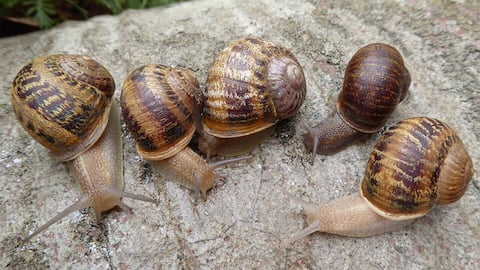New Zealand launches campaign to help this snail find love
What's the story
Ned, a rare left-coiling snail discovered in New Zealand, is facing a major challenge in finding a mate. The problem has led to a nationwide campaign to help him find love. Most garden snails have right-coiling shells, but Ned's unique left-coiling shell has caused his reproductive organs to be reversed. This condition occurs in about one in every 40,000 snails and makes mating with other snails difficult.
Discovery details
How Ned was discovered
Ned was discovered in a Wairarapa backyard, an hour north of Wellington. The find was made by illustrator and author Giselle Clarkson while she was digging vegetables. Initially thinking it was a different species, Clarkson soon realized the snail's shell coiled on the left side, making it unique. She had previously encountered left-coiling snails while working at New Zealand Geographic magazine.
Nationwide effort
Campaign to find a mate for Ned
After discovering Ned's uniqueness, Clarkson gave him a home in a fishbowl and informed the New Zealand Geographic magazine. They have since started a nationwide campaign asking people to check their gardens and parks for left-coiling snails. Anyone who finds one is urged to contact the magazine. The campaign hopes to connect people with nature while also raising awareness about gardening and natural world intricacies.
Ned and Jeremy
Unusual snail stories that amazed the world
Ned may be rare, but his story is not the first to capture public attention. Back in 2017, an international search was launched to find a mate for Jeremy, another lonely left-handed snail discovered in London. Two eligible left-spiraling snails were found, but they made headlines when they ended up pairing with each other. Jeremy eventually mated with one of them and produced offspring with exclusively right-spiraling shells before passing away at the age of two.
The campaign
Restoring human connection to nature
Despite being rare, Ned is actually a common garden snail and an introduced species considered a pest in New Zealand's gardens. While some gardeners might be skeptical about efforts to increase their numbers, the campaign has a larger purpose beyond boosting snail populations. A recent study revealed that human connection to nature has declined by 60% over 200 years. Encouraging children to engage with nature and greening urban spaces are among the most effective strategies to help reverse this decline.
